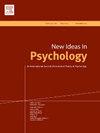The Kraemer Effect Reconsidered: Do probability-raising accounts of intentionality explain the Kraemer Effect?
IF 2.9
3区 心理学
Q2 PSYCHOLOGY, EXPERIMENTAL
引用次数: 0
Abstract
People tend to judge that agents bring about the ends more intentionally than the means. In three experiments, we test a new explanation for this so-called Kraemer Effect: people tend to judge that agents bring about the ends more intentionally than the means because they think that the agent's actions increase the probability of the ends more than the means, even though their objective probabilities are the same. In Experiment 1, we replicated the Kraemer Effect in English and German. In Experiment 2, we aimed to manipulate people's perceived probability increase of bringing about the ends and test whether this would decrease the size of the Kraemer Effect. In Experiment 3, we aimed to manipulate people's perceived probability increase of bringing about the means and test whether this would decrease the size of the Kraemer Effect. In both experiments, we found no evidence that manipulating the perceived probability increase of bringing about the means or the ends decreased the size of the Kraemer Effect. Overall, we found no evidence that a probability-raising account of intentionality explains the Kraemer Effect.
重新考虑克雷默效应:提高概率的意向性解释克雷默效应吗?
人们倾向于认为,行为人实现目的的意图多于手段。在三个实验中,我们对所谓的克雷默效应(Kraemer Effect)进行了新的解释:人们倾向于判断行为人实现目的的意图多于手段,因为他们认为行为人的行为比手段更能增加达到目的的概率,尽管他们的客观概率是相同的。在实验1中,我们在英语和德语中重复了克莱默效应。在实验2中,我们的目的是操纵人们感知到的导致结果的概率增加,并检验这是否会减小克雷默效应的大小。在实验3中,我们的目的是操纵人们感知到的带来均值的概率增加,并检验这是否会减小克雷默效应的大小。在这两个实验中,我们没有发现任何证据表明,操纵实现手段或目的的感知概率增加会降低克雷默效应的大小。总的来说,我们没有发现任何证据表明意向性的概率提高解释了克雷默效应。
本文章由计算机程序翻译,如有差异,请以英文原文为准。
求助全文
约1分钟内获得全文
求助全文
来源期刊

New Ideas in Psychology
Multiple-
CiteScore
4.80
自引率
3.80%
发文量
37
期刊介绍:
New Ideas in Psychology is a journal for theoretical psychology in its broadest sense. We are looking for new and seminal ideas, from within Psychology and from other fields that have something to bring to Psychology. We welcome presentations and criticisms of theory, of background metaphysics, and of fundamental issues of method, both empirical and conceptual. We put special emphasis on the need for informed discussion of psychological theories to be interdisciplinary. Empirical papers are accepted at New Ideas in Psychology, but only as long as they focus on conceptual issues and are theoretically creative. We are also open to comments or debate, interviews, and book reviews.
 求助内容:
求助内容: 应助结果提醒方式:
应助结果提醒方式:


